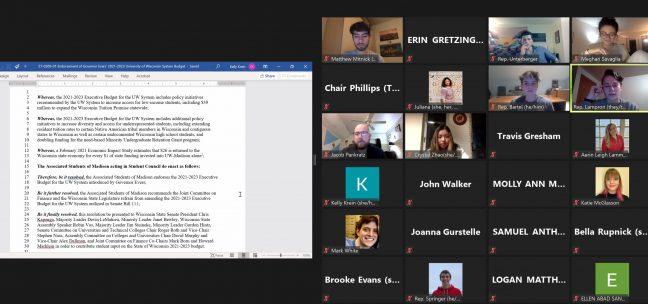The Associated Students of Madison passed legislation to increase the ethnic studies credit requirement, endorse Gov. Tony Evers’ University of Wisconsin System budget and amend wage policy bylaws at a Zoom meeting Tuesday.
ASM unanimously passed legislation to support Evers’ 2021 to 2023 UW System budget proposal. Evers’ budget proposal, if passed by the legislature, would reflect a 1.8% increase in the fiscal year of 2022.
Moreover, Evers’ budget, as it stands, would allocate the largest increase in general purpose revenue to the UW System budget in 20 years. Rep. Jacob Pankratz said these funds could provide the university financial support and also help fund some of ASM’s proposals.
Additionally, with the Republican-led legislature planning to scrap most of Evers’ budget and start anew, Pankratz said this legislation would uplift the body’s endorsement of Evers’ original UW System budget.
“I think this would be a way to input the student voice into that [legislative] process,” Pankratz said. “Just to say we are paying attention, and we are endorsing those provisions in the executive budget that we really appreciate.”
ASM also unanimously passed legislation to support a long-in-the-making proposal to increase the university’s ethnic studies requirement from three credits to six credits for all students. While a previous ASM Ethnic Studies Review Committee in 2016-17 recommended an increase from three to six credits, Tuesday’s legislation proposed the first formal endorsement of the upped requirement.
Crystal Zhao and Emma Cline, two of the sponsors on the legislation, said they have been working with student organizations and academic departments across the university to garner feedback for the new standard. Zhao and Cline said the requirement would go into effect for the class of 2026 to provide time for organizers to cross-list courses and work with different colleges on creating and adapting courses to fit all degree programs.
Some representatives brought up concerns about the feasibility of the extra three credits for some of the more rigid degrees’ credit requirements, such as majors in the School of Engineering and School of Business. Zhao and Cline said they will continue to work with these colleges to address these issues by cross-listing courses and building in courses to existing majors.
“We’re hoping to encourage students to understand how they can cross-list different classes … to make advisors more equipped to advise students on how to take more ethics classes without making them graduate later,” Zhao said.
ASM also discussed and passed legislation that would loosen the restrictions of their wage policy guidelines in order to ease the process of creating paid positions. Rep. Jack Phillips, who authored the legislation, said each student council session should be able to determine the work needed to be done and create paid positions on a year-to-year basis.
Phillips said this was a prominent issue when defining the roles of Mask Ambassadors, a position originally designed to help ASM allocate segregated fees to students financially struggling during the pandemic. But, Phillips said the rigid guidelines caused confusion within ASM and issues with the university in defining which students could actually be paid under ASM bylaws.
“One of the best uses of seg[regated] fees is going to be paying students who are doing work for the university and for ASM. So this is getting rid of … some limitations on the kinds of jobs that can exist under ASM,” Phillips said. “We’re also proposing some language that clarifies exactly what is an unpaid position.”
Currently, individuals in ASM can only be paid if they meet a series of requirements, including the submission of bi-weekly reports to both bodies, weekly written justification of hours worked, active supervision of future ASM leaders, facilitation of meetings and maintenance of weekly office hours open to the public.
Phillips said these criteria rule out many valuable entry-level positions and create barriers for students to serve on ASM who cannot afford to do unpaid work. Several representatives had concerns about accountability within ASM to diligently use segregated fees and avoid creating paid positions arbitrarily.
After passing two amendments to adjust the language of the legislation to include a caveat for the next section in order to ensure accountability measures are incorporated for the council to maintain good stewardship of segregated fees, the legislation passed. To be implemented into the bylaws, ASM will hold a second and final vote on the same legislation at their next meeting.


